SAP is one of the world’s leading producers of software for managing business processes, developing solutions that facilitate effective data processing and information flow across organizations. In this chapter, we will try to understand more on ERP and where it should be used. Furthermore, we will learn the implementation techniques of ERP along with the ERP packages available in the market.
Contents
What is SAP?
SAP ERP is enterprise resource planning software developed by the company SAP SE. ERP, or Enterprise Resource Planning, software is modular software designed to integrate the core functions of an organization’s core business processes into a unified system.
An ERP system consists of software components, called modules that focus on essential business functions such as finance and accounting, human resources, production, materials management or customer relationship management (CRM). Organizations use only those modules that they require to run their particular business.
History of SAP
SAP was started in 1972 in Mannheim, Germany, by five former IBM employees. The original idea for SAP was to provide customers with the ability to interact with a common corporate database for a broad range of applications in real time.
In 1973, SAP released the R/1, a financial accounting system. R/1 ran on the IBM Server and Disk Operating System (DOS), and had a single-tier architecture with presentation, application, and data on a single platform.
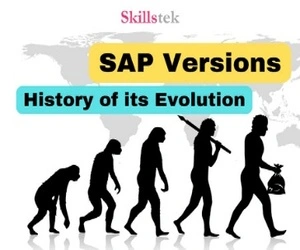
In 1979, SAP released R/2, a mainframe system that provided real-time data processing in accounting, manufacturing, supply chain, and human resources.
What is the meaning of SAP?
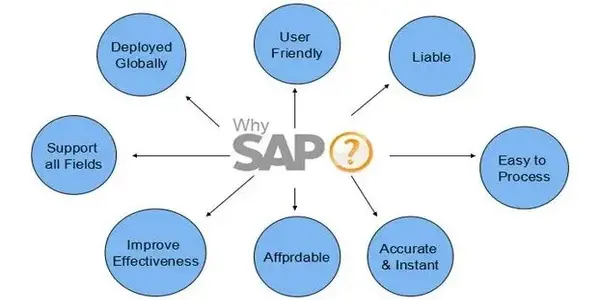
The original name of SAP, translated from German, was Systems Analysis and Program Development. The syllables are pronounced individually. The “SE” in the full corporate name, SAP SE, stands for Societe Europaea, which is based in the U.S. The word is similar to “inc.”
SAP is a multinational software vendor and the market-share leader in ERP. The company currently serves more than 180 countries and offers on-premises, cloud, and hybrid deployment models, although cloud computing options are the focus of most of its growth efforts.
What is SAP enterprise resource planning (ERP)?
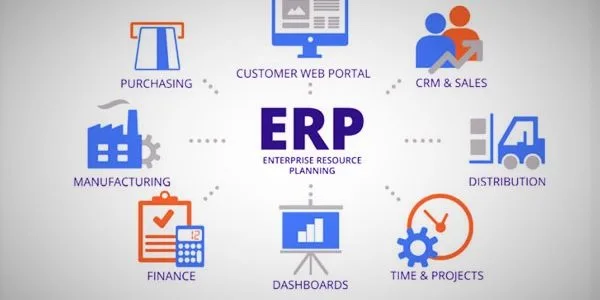
SAP’s various ERP products enable its customers to run their business processes, including accounting, sales, production, human resources, and finance, in a unified environment, with data from each module stored in a central database. The tight integration and common data store ensure that information flows from one SAP ERP component to another without the need for redundant data entry and help enforce financial, process, and legal controls.
The most widely installed SAP system, SAP ERP Central Component (SAP ECC), is an on-premises ERP system typically implemented in medium- and large-sized companies.
How Does the SAP ERP System Function?
As an on-premises ERP system, SAP ECC is typically deployed in a three-tier, client-server architecture. There are three tiers: the presentation tier, the application tier, and the database tier.
The presentation tier provides the user with the SAP graphical user interface (SAP GUI), which can be installed on any computer using Microsoft Windows or macOS. The SAP GUI is the point of communication between the user and the ECC.
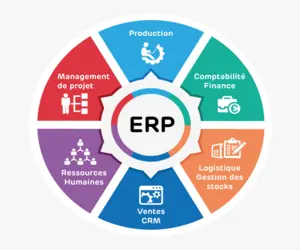
The application tier is the core of ECC. It is responsible for processing transactions, executing business logic, running reports, monitoring access to databases, printing documents, and communicating with other applications.
The database tier is where transaction records and other data are stored.
Also check:
-
Blog Writing vs. Social Media Writing: What's the Difference?
-
5 Best Computer Course in India for Private Job (India में प्राइवेट नौकरी के लिए 05 BEST कंप्यूटर कोर्स)
-
Google jobs in India | Google में चाहिए नौकरी तो कर ये 5 कोर्स - मिलेगा लाखों का पैकेज | Google Jobs
-
Retail Management Career | Retail Jobs | How to get Retail Management Job
-
How to Start Earning as a Graphic Designer?
Key SAP ERP features of capabilities
ECC is the ERP system at the heart of SAP Business Suite, a comprehensive collection of modules that handle other common business processes, such as supply chain management (SCM) and product lifecycle management (PLM).
S/4HANA is the vendor’s in-memory ERP platform that was released in 2015. It is an ambitious rewrite of the business suite optimized for the SAP HANA in-memory database platform. S/4HANA, according to SAP, is meant to reduce complexity and eventually replace SAP ECC.
SAP S/4HANA Cloud is the SaaS version of S/4HANA, providing the benefits of HANA’s in-memory processing and real-time data accessibility within a subscription-based SaaS model.
SAP Business by Design is a SaaS ERP system that was originally marketed to SMBs, but today it is in the midmarket segment of the SAP product line. A fourth ERP product, SAP Business One, is geared towards small businesses and runs on premises or in the cloud.
Advantages And Disadvantages of SAP
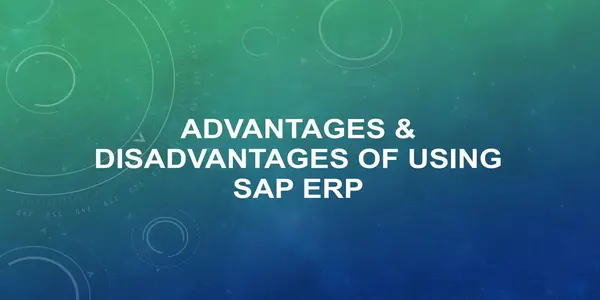
- The main advantages of SAP ERP systems, especially those intended for large enterprises (ECC and S/4HANA), include the following:
- Standardization of the business processes of an organization;
- An integrated view of business;
- Compatibility; As well as
- Strong reporting and analytics features that aid decision making.
- High procurement and implementation costs, including purchasing the software itself and the underlying infrastructure, labor costs of internal IT staff and external consultants, costs of training staff, and residual costs of software maintenance and periodic upgrades; And
- The complexity of the system, meaning that implementation could take several years.
Conclusion
Now that you know what SAP is and what are the benefits of using SAP software system, it is time for the implementation of this ERP in your E-Commerce store to automate and optimize processes, increase efficiency and reduce unnecessary costs. This lens provided architectural guidance to design, build, and operate reliable, secure, efficient, and cost-effective SAP workloads on AWS. We comprehensively captured common patterns, lessons learned, and SAP design recommendations.
FAQs
SAP stands for “System Applications and Products in Data Processing.” The SAP software system was developed in 1971 by five IBM engineers, Hope, Wellenreuther, Hector, Tchira, and Plattner, who worked together on an internal project. In June 1972, he left IBM and founded SAP.
ERP is basically a software suite of different applications associated with business process management. SAP is a software development corporation providing ERP software solutions in the market. ERP is a tool used to manage business processes in various industries.
No it is not difficult to learn but you need to give 2 (two) hours daily. Practice as much as you can. First of all, I need to say that there is a clear and straightforward solution to how to become efficient. I have written a post about this and you can read it here How to become a SAP consultant.
It is recommended that the candidate have a relevant academic background in disciplines including computer science, business administration, finance, accounting, human resources, information systems, operations management, and systems engineering.
You can complete the course to earn certification within three to six months. If you are familiar with SAP technology, you may be able to learn quickly and crack the certification exam quickly. There are many options for taking courses, such as online options, in-person classes, and blended learning.
In India, the average starting salary for a SAP Basis Consultant is approximately 3.2 lakh per year (26.7k per month).
In my opinion, there is no age limit for a desirable candidate, but consider the current situation too! If he has more than 15 years of experience, out of which at least 8–10 years are in a managerial capacity.
Yes, one can change careers and become an SAP consultant without a technical degree or non-technical job experience. If you go for the SAP course, then SAP stands for systems, applications, and products in data processing. SAP ERP is currently one of the company’s most powerful enterprise resource planning systems.


